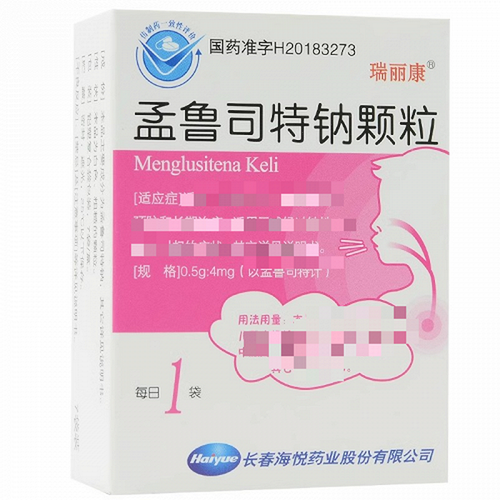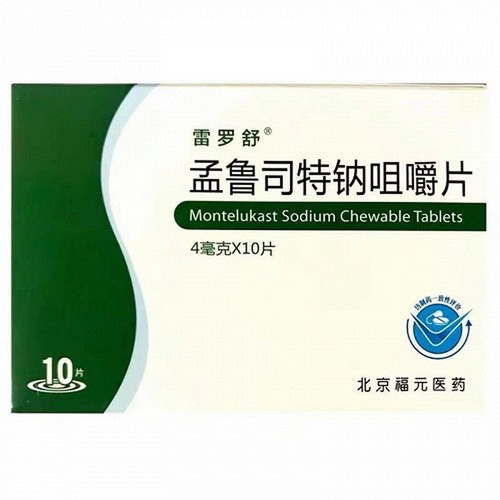Product Overview
[Drug Name]
Generic Name: Montelukast Sodium Granules
Trade Name: AiBeiZuo MengLuSiTeNaKeLi (0.5g, 4mg x 14 bags)
Pinyin Code: AiBeiZuo MengLuSiTeNaKeLi (0.5g, 4mg x 14 bags)
[Main Ingredients]
Main Ingredient: Montelukast Sodium. Chemical Name: [R-(E)]-1-[1-[3-{2-(7-chloro-2-quinolinyl)vinyl]phenyl]-3-{2-(1-hydroxy-1-methylethyl)phenyl]propyl]thio]methyl]cyclopropaneacetic acid sodium. Molecular Formula: C35H35CINNaO3S. Molecular Weight: 608.18
[Properties]
This product is white granules.
[Indications/Main Functions]
This product is indicated for the prevention and long-term treatment of asthma in children over one year old, including prevention of daytime and nighttime asthma symptoms, treatment of aspirin-sensitive asthma, and prevention of exercise-induced bronchoconstriction. This product is indicated for the relief of symptoms caused by allergic rhinitis (seasonal and perennial allergic rhinitis in children aged 2 to 5 years).
[Specifications]
0.5g: 4mg x 14 bags
[Dosage and Administration]
Once daily. Asthma patients should take the medication at bedtime. Allergic rhinitis patients can take the medication at a more appropriate time based on their condition. Patients with both asthma and allergic rhinitis should take the medication once nightly. Children aged 1 to 2 years with asthma should take one bag once daily. Children aged 2 to 5 years with asthma and/or allergic rhinitis should take one 4mg oral granule bag daily. Oral granules can be taken directly, mixed with one spoonful of room temperature or cold soft food (such as applesauce), or dissolved in one teaspoon of room temperature or cold infant formula or breast milk. Do not open the bag until ready to take. After opening the bag, take the entire dose immediately (within 15 minutes). This product should not be stored until the next dose after mixing with food, infant formula, or breast milk. This product should not be dissolved in liquids other than infant formula or breast milk. However, water is acceptable after taking this product. It is generally recommended to evaluate the effectiveness of treatment based on asthma control indicators, and the effectiveness of this product is apparent within one day of taking this product. This product can be taken with or without food. Patients should be advised to continue taking this product regardless of whether their asthma is under control or exacerbated. No dosage adjustment is required for patients with renal insufficiency, mild to moderate hepatic impairment, or gender. Relationship between this product and other asthma medications: This product can be added to a patient's existing treatment regimen. Reducing the dose of concomitant medications: For patients whose asthma is not effectively controlled with bronchodilators alone, this product can be added to their treatment regimen. Once a clinical response is observed (usually after the first dose), the bronchodilator dose can be reduced based on the patient's tolerance. For patients with asthma receiving inhaled corticosteroids, the dose of the corticosteroid can be appropriately reduced based on the patient's tolerance. The dose should be gradually reduced under the guidance of a physician. Some patients can gradually reduce the dose until inhaled corticosteroids are completely discontinued. However, this product should not be used abruptly to replace inhaled corticosteroids or as directed by a physician.
[Adverse Reactions]
See the package insert for details.
[Contraindications]
This product is contraindicated in patients with allergies to any of the ingredients in this product.
[Precautions]
The efficacy of this product for the oral treatment of acute asthma attacks has not been established. Therefore, it should not be used to treat acute asthma attacks. Patients should be advised to have appropriate rescue medications available. Although the dose of concomitant inhaled corticosteroids can be gradually reduced under the guidance of a physician, this product should not be used abruptly to replace inhaled or oral corticosteroids. Patients with known aspirin sensitivity should continue to avoid taking aspirin or nonsteroidal anti-inflammatory drugs while taking this product. Neuropsychiatric events have been reported in adults, adolescents, and children taking the original product. Postmarketing reports of adverse events with the reference product include agitation, aggression or hostility, anxiety, depression, disorientation, attention deficit disorder, abnormal dreams, stuttering (stammering), hallucinations, insomnia, irritability, memory impairment, obsessive-compulsive symptoms, restlessness, sleepwalking, suicidal thoughts and behaviors (suicidality), convulsions, and tremors. Clinical details in some postmarketing reports of the reference product appear consistent with drug-induced effects. Psychoneural events have been reported in patients taking this product (see Adverse Reactions). Because other factors may contribute to these events, a relationship to this product cannot be confirmed. Physicians should discuss these adverse events with patients and/or caregivers. Patients and/or caregivers should be advised to notify their physicians if these events occur. Rarely, one or more of the following has occurred in patients receiving antiasthma medications, including leukotriene receptor antagonists: eosinophilia, vascular rash, worsening pulmonary symptoms, cardiac complications, and/or neuropathy (sometimes diagnosed as Churg-Strauss syndrome, a systemic eosinophilic vasculitis). These events are sometimes associated with reduction or discontinuation of oral glucocorticoid therapy. Although a causal relationship between these events and leukotriene receptor antagonists has not been established, caution and appropriate clinical monitoring are recommended for patients taking montelukast sodium.






